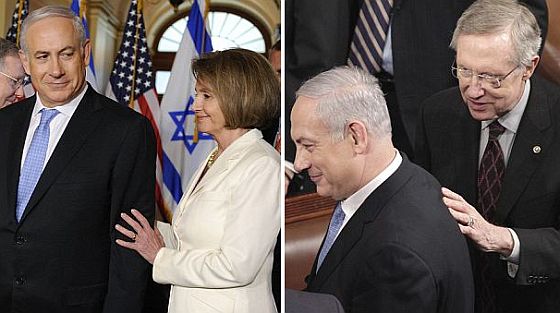Haaretz reports:
Over 5000 Christians, mainly Evangelicals, gathered this week at the Convention Center in Washington for the annual conference of the organization CUFI, Christians United For Israel.
Prime Minister Benjamin Netanyahu addressed the Christian Zionist conference via satellite, telling them, “When you support Israel, you don’t have to choose between your interests and your values; you get both.”
The prime minister encouraged the conference attendees to not only think of Israel as an ally of the Unites States, but as indistinguishable from it. “Our enemies think that we are you, and that you are us,” added Netanyahu. “And you know something? They are absolutely right.”
Ambassador to the U.S. Michael Oren compared the participants’ support of Israel to British military officer Orde Wingate’s training of Jewish paramilitary units before the establishment of the State of Israel. “We thank you for carrying out this vision,” Oren told the CUFI conference participants.
News commentator Glenn Beck worked the audience into a frenzy, decrying the historical persecution of Jews, insisting that Israel cannot cede control over territories it controls, and calling upon the conference attendees to declare that they, too, are Jewish.
“Jews have been chased out of every corner of this planet,” said Beck. “Enough is enough.” Beck said that new states can be established, but not at the expense of other states, and that Israel is historically the ‘Land of the Jews’, implying that Israel should not relinquish control over the West Bank in order to create a State of Palestine.
Beck repeated a refrain that Netanyahu had introduced earlier, appealing to audience members to self-identify as Israelis and Jews themselves. He exhorted, “When we see Israelis not as part of us, but as us, we can move to the next level as human beings,” adding, “Let us declare ‘I am a Jew,’ they cannot kill all of us”.
The conference attendees learned that Pastor John Hagee, the founder of CUFI, would be joining Beck for his planned rally in Jerusalem in August.
Hagee told the audience, many of whom were waving both Israeli and American flags, “We gathered here with one message: Israel today, Israel tomorrow, and Israel forever.” He added, “President Obama is no friend of Israel”.
“The truth is not what you think that it is – it’s what the Bible says”, Hagee proclaimed. “There are two ways to live your life – the Torah way and the wrong way.”
“If the US Administration forces Israel to divide Jerusalem – God will turn his back to the United States of America. The G-d of Abraham, Isaac and Jacob is watching America,” Hagee continued. “Mister President, go tell Russia and the Chinese what to do.”
“Iran will soon become nuclear. Our President is waiting for Iran to extend a friendly hand, and it’s not going to happen,” Hagee added. “Mister Ahmadinejad, don’t threaten Israel. What you do to the Jewish people, history proves, will be done to you.”


 Mr. Ross is the most senior member of a coterie of American diplomats who have advised presidents stretching back to Ronald Reagan. Unlike many of his colleagues, Mr. Ross has thrived in Republican and Democratic administrations.
Mr. Ross is the most senior member of a coterie of American diplomats who have advised presidents stretching back to Ronald Reagan. Unlike many of his colleagues, Mr. Ross has thrived in Republican and Democratic administrations.